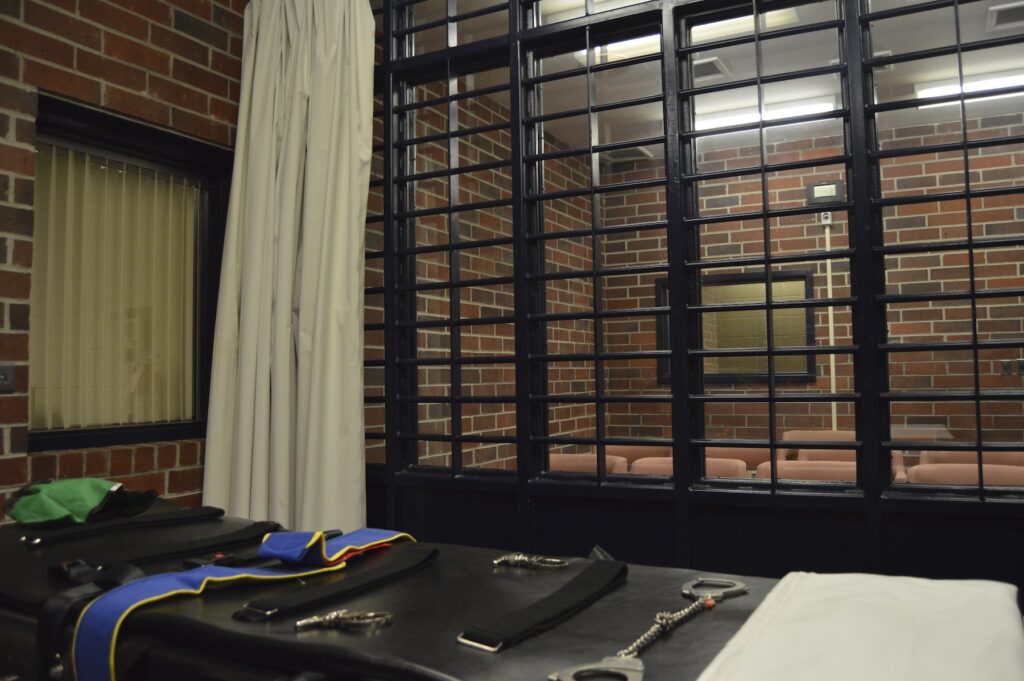
The Tennessee Supreme Court says the state’s prison system can execute Byron Black without deprogramming his heart implant. The court has also left the door open for the state’s Department of Correction to find a doctor willing to do it.
Given the medical profession’s ethical codes on executions, that could be unlikely. It’s a tension that has intensified in the week before Black’s scheduled execution on Aug. 5.
Black is in heart failure, so he has an implant that will shock his heart if his pulse gets too low or his heart goes out of rhythm. That second function, defibrillation, has Black’s attorneys concerned he could be jolted by painful shocks as he dies. In July, they persuaded a Nashville judge, who ordered TDOC to bring in a medical team and high-tech equipment to disable the device.
The state pushed back, saying only Nashville General Hospital could disable the device, and noting that its medical team wouldn’t carry out the task at the prison and on the judge’s rigid timeline. Then, a week before the execution, Nashville General told WPLN News it never actually signed off in the first place.
It’s unlikely a new plan will materialize, said Dr. Matthew Wynia, director of the Center for Bioethics and Humanities at University of Colorado’s medical school. That’s because it would require a doctor to participate — even somewhat indirectly — in an execution.
“You’re gonna have a very hard time finding a doctor who says it’s OK for physicians to act as agents of the state and kill people, or help to kill people,” he said.
‘False humanity’
Previously, Davidson County Chancellor Russell T. Perkins said the device had to be disabled moments before the execution at the Riverbend Maximum Security Institution in Nashville, where executions take place. He later updated the order and said Black could be transported to the hospital earlier that morning.
That separation — and the fact this is a typical procedure — could give a physician room to consider it, Wynia said.
“You could conceivably say … we disable these things all the time for patients who tell us they don’t want them anymore,” he said. “I could imagine someone drawing a way around this in some way. But in the current case, it’s almost impossible now, because it’s very clear that the reason you’re doing this is to facilitate execution.”
The state’s role in the matter, Wynia says, is what distinguishes the situation from physician-assisted death.
A physician would also have to take into consideration how this procedure would only protect Black from the possibility of severe pain during what is ultimately a fatal impact. Wynia said that’s a common ethical quandary.
“This is why Dr. Guillotin invented the guillotine, right?” he said. “The person, you know, being asked (to deprogram Black’s implant) must have the same sense of, ‘Well, but at least I’m it more humane.’ And the unfortunate result of that is … the sort of false humanity of killing someone.”
‘Where consensus is very strong’
Wynia said if the state were concerned about pain alone, it wouldn’t be using lethal injection.
“There are rapid ways to kill someone that are very humane to the individual being killed, guillotine primary among them,” he said. “The reason the state keeps coming to physicians asking for our help is because people feel uncomfortable watching someone die that way.”
Doctors act as medical witnesses in capital cases often — even discussing the science of dying by lethal injection, nitrous gassing and other methods. Wynia said there is a line in the sand there, too. He pointed to a 2018 U.S. Supreme Court case, Bucklew v. Precythe.
In that case, the condemned also had unique health challenges.
Russell Bucklew had tumors in his head, neck and throat. Drugs used in lethal injection, like pentobarbital, are caustic and damage tissues. His attorneys argued that the drug could rupture his tumors and cause severe pain. They said the nitrogen gas method could be safer for him.
The medical expert in that case explained the anatomy, but refused to make an endorsement.
“The doctor who testified said, ‘I will not testify as to whether one of these is more or less painful than the other because that would comprise collaboration or participation in the execution process,’ ” Wynia said.
The American Medical Association filed an amicus brief to the court. While the group wasn’t involved in the lawsuit directly, the association wanted to weigh in on the overarching issue.
The group supported the medical witness’s neutrality, saying, “It is unethical to use the skills and training developed to care for the patient in order to kill at the request of the state.”
The detailed brief quoted several other organizations. It noted that The American Public Health Association has formally announced a policy position that “health professional participation in executions or pre-execution procedures is a serious violation of ethical codes.”
Wynia said that wasn’t surprising.
“Every medical group of any kind that has ever looked at this, they all come down on the same side,” he said. “This is an area where consensus is very strong.”

